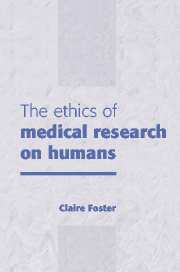Book contents
- Frontmatter
- Contents
- Foreword by Professor Sir David Weatherall
- Acknowledgements
- 1 An introduction to the ethical issues
- 2 Goal-based morality: scientific rigour in research
- 3 Duty-based morality: acting in the research subjects' best interests
- 4 Right-based morality: respecting the autonomy of research participants
- 5 From principles to practice
- 6 Case studies of goal-based issues
- 7 Case studies of duty-based issues
- 8 Case studies of right-based issues
- 9 A framework for ethical review: researchers, research ethics committees, and moral responsibility
- References
- Index
8 - Case studies of right-based issues
Published online by Cambridge University Press: 15 August 2009
- Frontmatter
- Contents
- Foreword by Professor Sir David Weatherall
- Acknowledgements
- 1 An introduction to the ethical issues
- 2 Goal-based morality: scientific rigour in research
- 3 Duty-based morality: acting in the research subjects' best interests
- 4 Right-based morality: respecting the autonomy of research participants
- 5 From principles to practice
- 6 Case studies of goal-based issues
- 7 Case studies of duty-based issues
- 8 Case studies of right-based issues
- 9 A framework for ethical review: researchers, research ethics committees, and moral responsibility
- References
- Index
Summary
Introduction
This chapter will look at the practical application of right-based morality in research on humans, which is expressed as the need to obtain consent and to respect confidentiality. These are the two primary moral demands of right-based morality, as I have defined it. By consent is meant the adequately informed, voluntary agreement of a competent person to participate in research. By confidentiality is meant the non-disclosure of private information which has been given in a medical context, where no consent to disclosure has been given or can be assumed.
When consent and confidentiality were discussed at a theoretical level it was argued that they were essential moral requirements. In the context of particular cases, goal-based demands for rigorous science and duty-based demands to act in a patient's best interests also weigh in the balance. I propose to consider the right-based requirement for consent in the face of goal-, duty- and, paradoxically, right-based obstacles to its being successfully obtained. Empirical studies of the consent procedure for these purposes will be concentrated on. The extent to which the use of consent forms can be regarded as helping or hindering the consent process will also be considered. Under confidentiality one argument against respecting it, which arises from the goal-based need to conduct records-based research, will be considered.
Consent
Consent to participation in research is demanded by the right-based principle, that no person should be treated merely as a means to an end, but always also as an end in herself.
- Type
- Chapter
- Information
- The Ethics of Medical Research on Humans , pp. 113 - 132Publisher: Cambridge University PressPrint publication year: 2001



